One of the best foods for gut health is microgreens. The health benefits of microgreens are vast, and you should definitely include them in your diet!
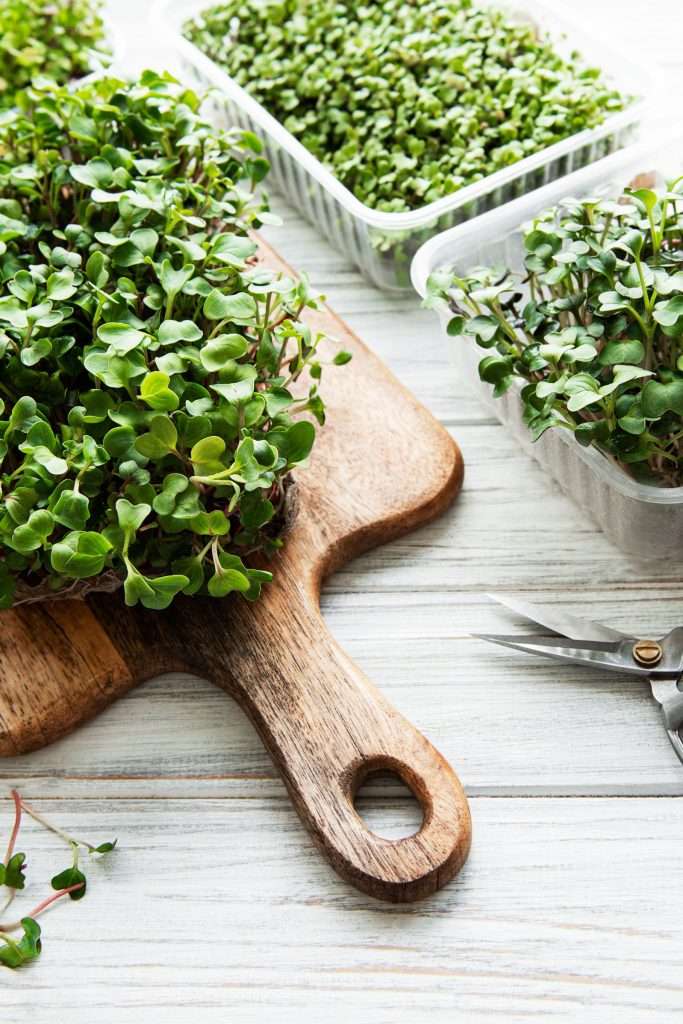
What Are Microgreens?
Microgreens are just very young vegetables. They’re tiny vegetable seedlings that only grow for about 7-21 days before you harvest them.
They are colorful and have a dense concentration of nutrients. Microgreens are also easier to digest than their full-grown counterparts.
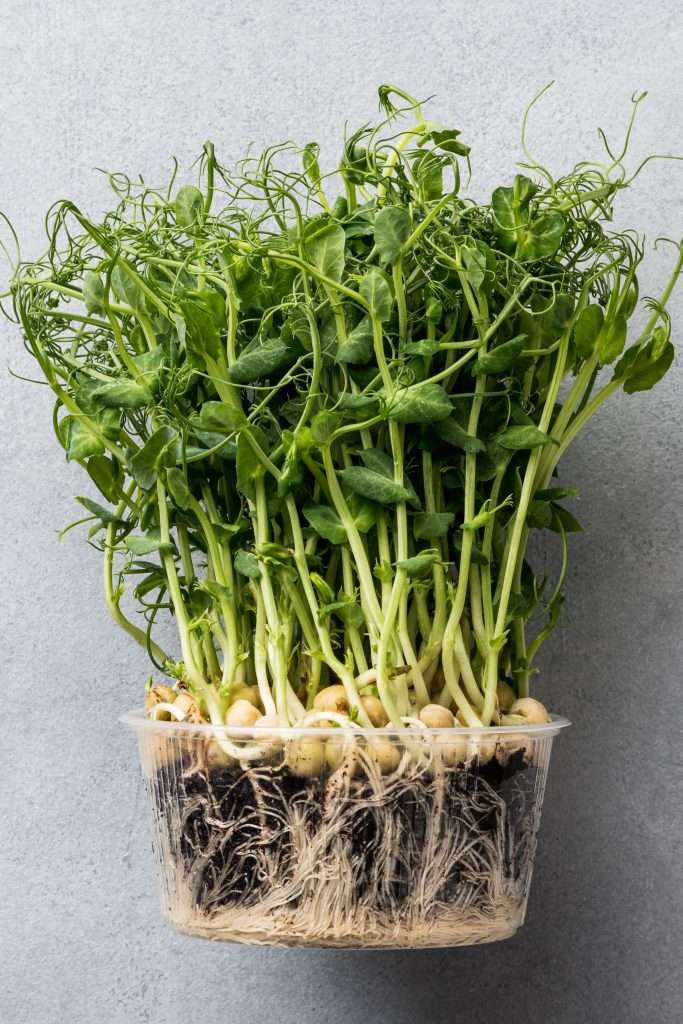
Types of Microgreens
The flavor of microgreens varies by type of vegetable. The flavor is a bit more concentrated than the full-grown version.
The families of microgreens are the same as the full-grown vegetables. My favorite family of microgreens is the Brassicaceae family, aka the cruciferous vegetables.
Amaranthaceae family: Amaranth, quinoa, swiss chard, beet, and spinach
Amaryllidaceae family: Garlic and onion
Apiaceae family: Celery, carrot, and dill
Asteraceae family: Lettuce, endive, chicory and radicchio
Brassicaceae family: Cauliflower, broccoli, cabbage, watercress, radish, and arugula
Cucurbitaceae family: Melon, cucumber, and squash
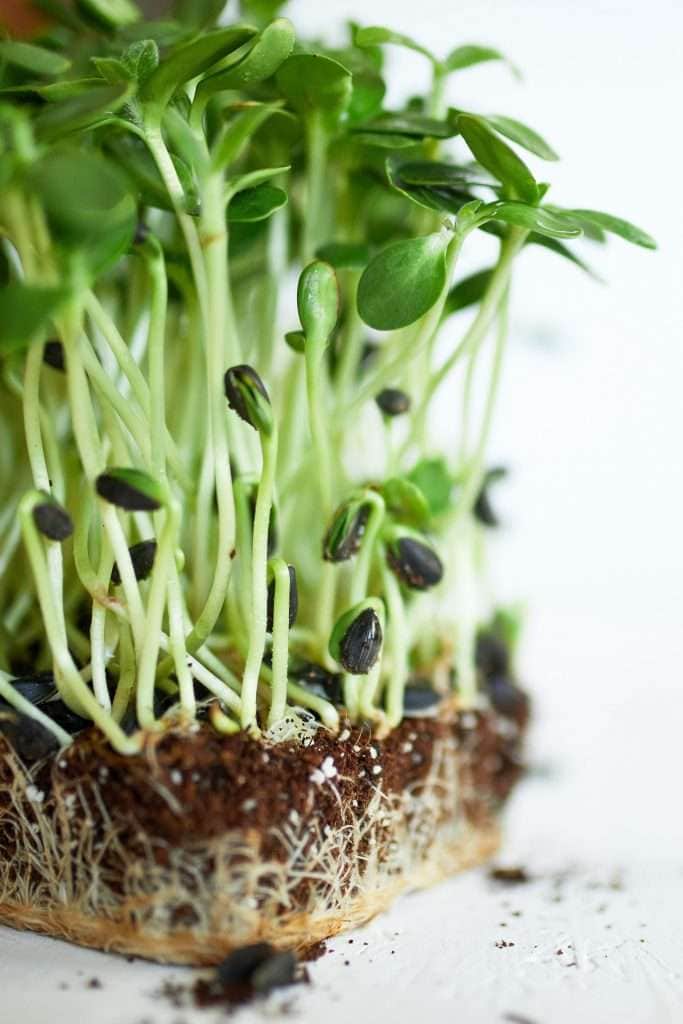
The Health Benefits of Microgreens
Microgreens can contain over 100 times the amount of health-promoting phytochemicals compared to mature vegetables. They’re rich in antioxidants, vitamins, and phytochemicals. So microgreens can be beneficial in preventing cancer, Alzheimer’s, diabetes, and heart disease.
Cancer: Fruits and vegetables are naturally rich in polyphenols, which have antioxidant properties. Polyphenols in foods can lower the risk of various types of cancer, especially colon cancer. Of course, microgreens are the most beneficial if consumed with an overall healthy diet.
Diabetes: Certain types of stress can prevent your body from adequately metabolizing sugars. The antioxidants found in microgreens may reduce stress hormones helping to regulate cellular sugar uptake.
Alzheimer’s: Antioxidant polyphenol-rich foods have been shown to lower the risk of Alzheimer’s.
Heart Disease: Regular consumption of antioxidant-rich fruits and vegetables can improve lipids and lower blood pressure. This means an overall reduction in cardiovascular risk factors.
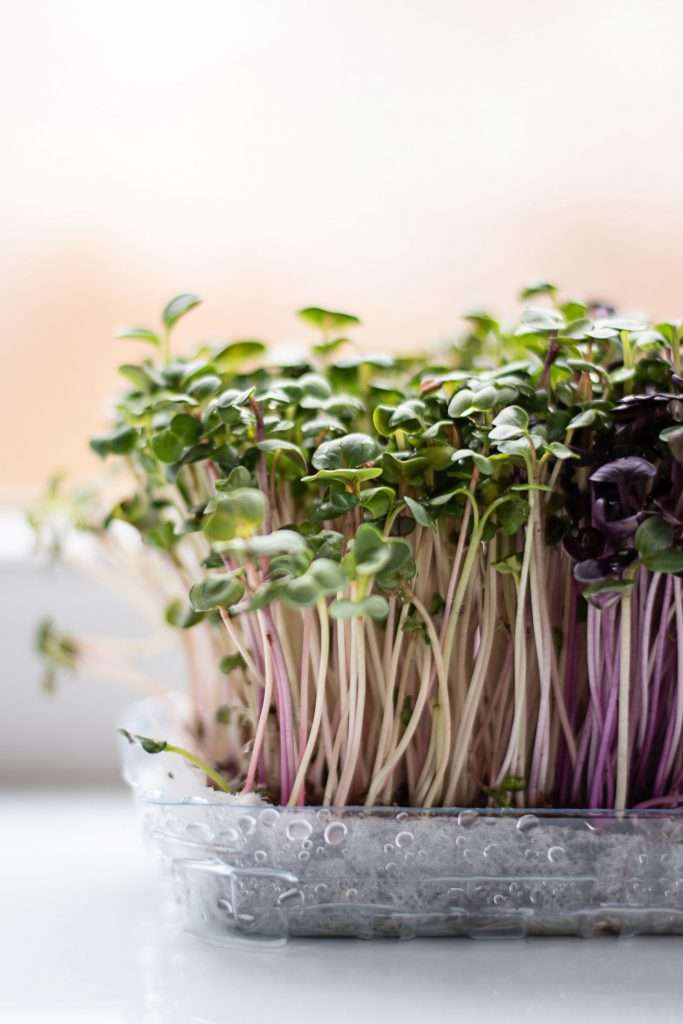
The Gut Health Benefits of Microgreens
Microgreens naturally contain health-promoting compounds, but once the microgreens you eat reach your gut microbiome, things get even healthier!
Microbes in the gut microbiome utilize many enzymes to convert the compounds in the foods you eat into more bioavailable antioxidants and other health-promoting compounds.
The microbes can create even more health-promoting compounds when you provide your gut microbiome with excellent starting materials like fruits, cruciferous vegetables, root vegetables, and whole grains.
For instance, microorganisms in a healthy gut microbiome can utilize an enzyme called myrosinase to transform compounds in microgreens into bioavailable phytonutrients.
One way they do this is by using myrosinase to convert the glucoraphanin in microgreens into the potent antioxidant sulforaphane.
Sulforaphane is a phenolic phytochemical with a lot of antioxidant properties. Once it’s bioavailable through microbial action in the gut, sulforaphane can help prevent cancer, encourage fat loss, improve cardiovascular health, and reduce inflammation.
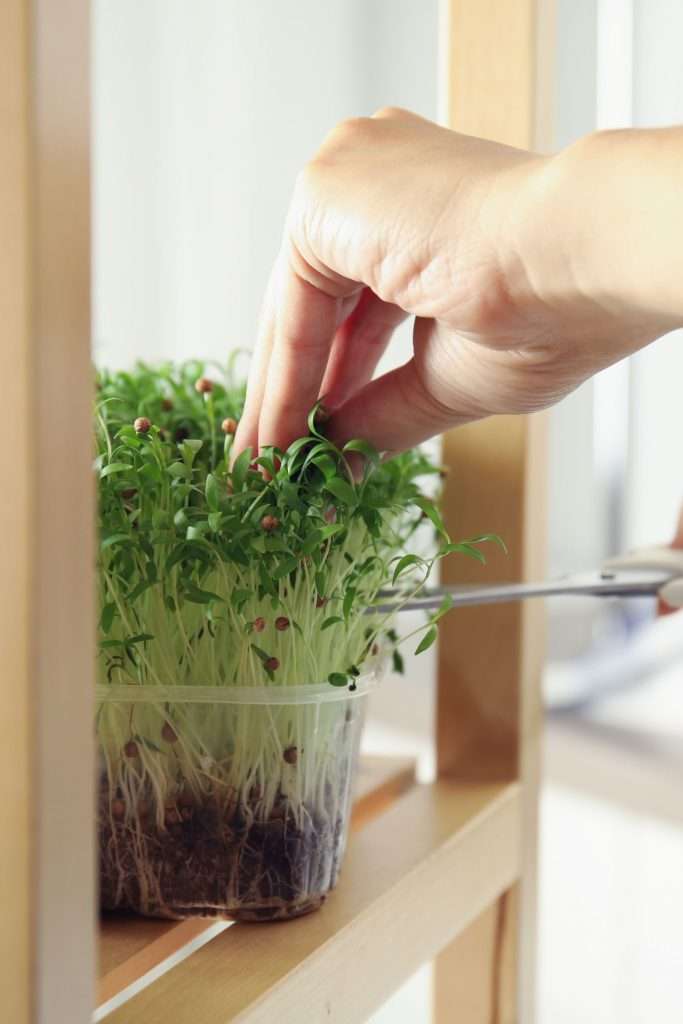
The Best Microgreen for Gut Health
Here is a simple list of my favorite microgreens to get started. If you’re trying microgreens for the first time, I suggest starting with these:
- kale microgreens
- basil microgreens
- beet microgreens
- radish microgreens
- carrot microgreens
- broccoli microgreens
How To Eat Microgreens
You can eat microgreens with any dish! Add them to salads, sandwiches, ramen, and even smoothies. We love throwing a handful of broccoli sprouts into our smoothies.
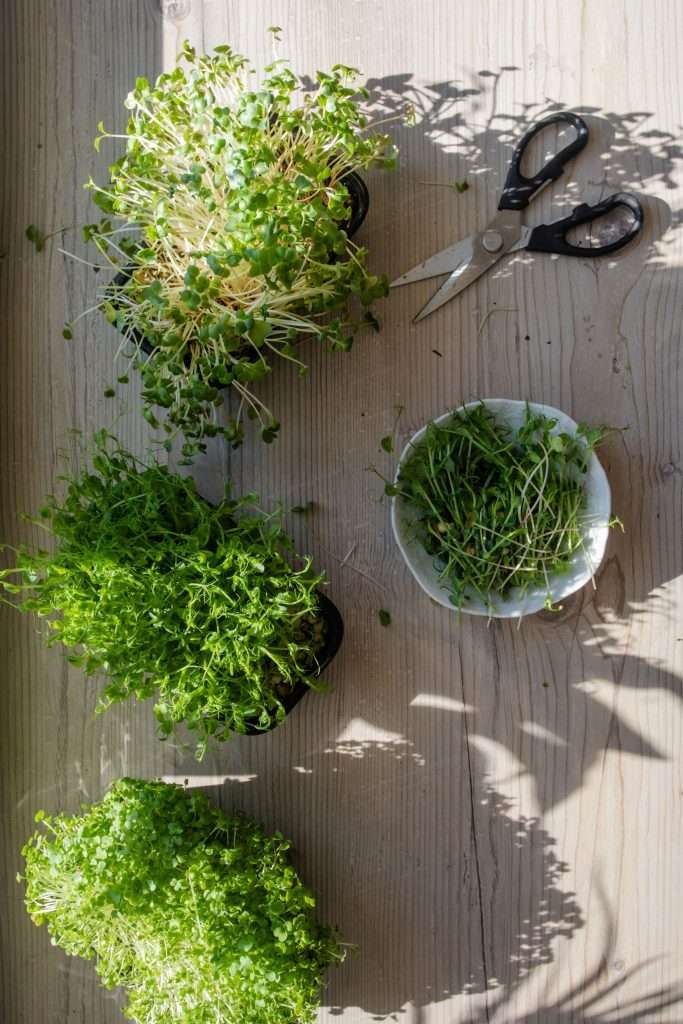
References:
Isothiocyanate from Broccoli, Sulforaphane, and Its Properties.
Dietary polyphenols for treatment of Alzheimer’s disease–future research and development.

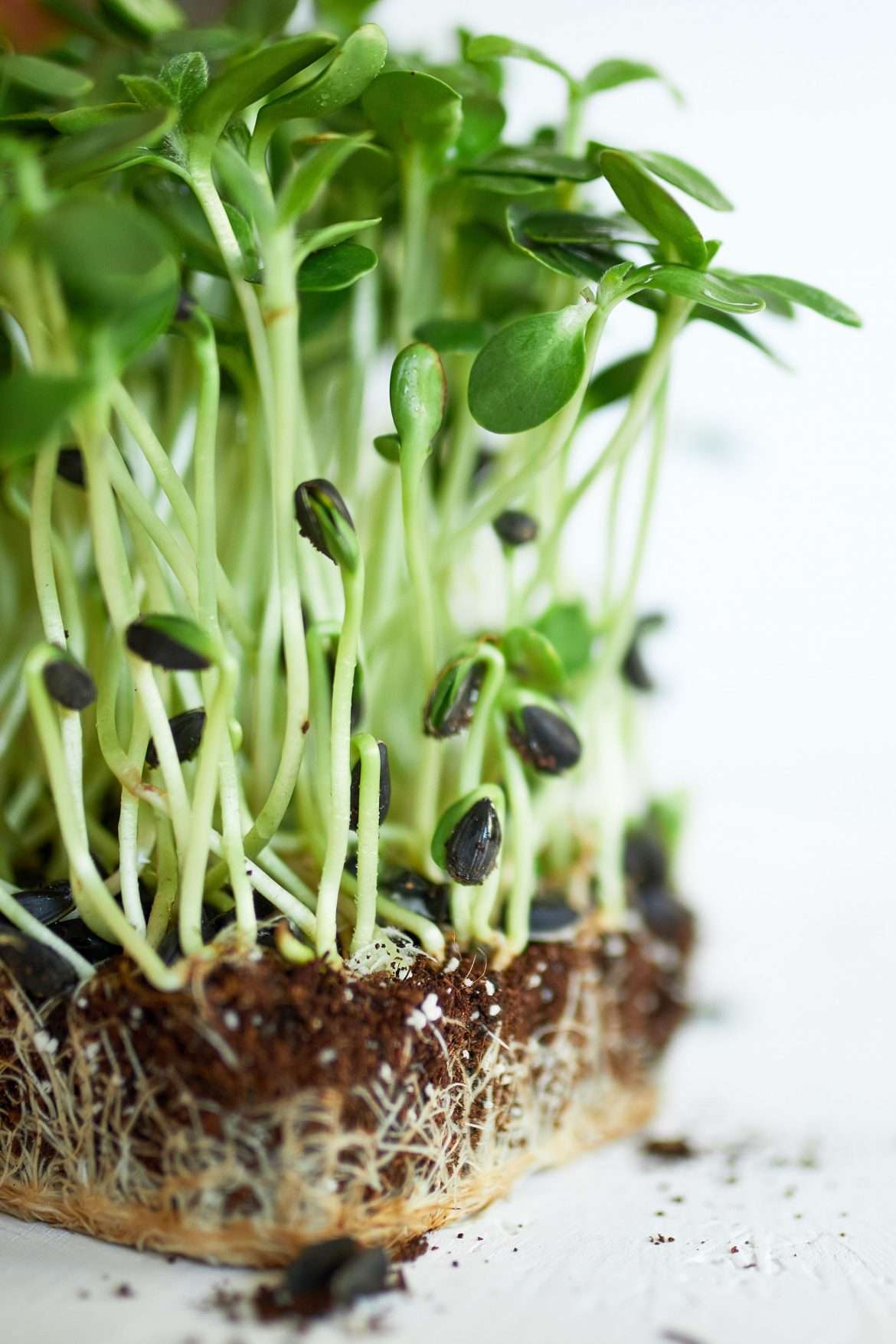


6 comments
I wish I could eat veggies, grains…I cannot digest them. I have MS, SIBO and IBS-C. I used to be vegan until I could not digest soy, alot of veggies, grains, etc. then I had to incorporate cultured dairy into my diet and I started to heal. I hear so many opposing views on what to eat for your gut…I have to listen to my own body and do what I believe it tells me to do…it will always let me know one way or another.
I have just bought some micro greens and going to see how I do with them, I may need to cook them a little, hoping not.
Given your conditions, you should follow dietary advice and recommendations from your doctor. I suggest consulting a registered dietician before introducing new foods to your diet.
I would love to know how you recommend cleaning seeds before sprouting. I made myself very sick from home grown broccoli sprouts. I have read it’s possible to wash the seeds with a bleach solution but I’m not a fan of bleach.
I rinse the seeds at least five times, then sprout them in a sprouting jar with rinsing twice a day.
Hi Kaitlyn, I have been growing very successfully my microgreens hydroponically for myself and family. I have heard that hydroponically grown microgreens aren’t exposed to the microbiome of the soil and are inferior to those grown in soil. Personally when I first began growing I was using these potting soils sold specifically for microgreens but found a lot of the “organic” ingredients questionable and had problems with mold and other issues. When I switched to hydroponics my products did not have these issues and were super clean and healthy. Just wondering if you might have something to say about this. Of course when I grow I want my plants to be as nutritious as possible. Also a lot of the “organic” grow mediums being sold had chicken manure and “acceptable” levels of heavy metals that was very concerning. I also see a lot of growers using Coco coir. Is there a microbiome in that that benefits the plants? I am hoping you might have some answers to my questions and concerns . . . Thanks for your work and taking the time to read this 🙏
The soil microbiome, or lack thereof, will of course influence the micronutrients and minerals in the microgreens, as with any plant. Microgreens grown in an organic soil mix will usually grow better, taste more intense, and have more minerals and micronutrients than hydroponically grown. But if growing them hydroponically works for you, then you should keep doing what you are doing.